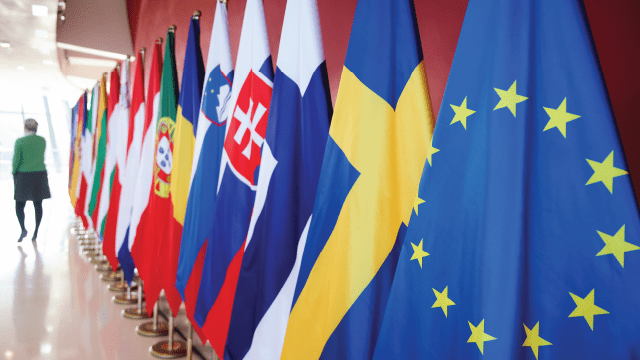
Opinions of the European Union remain broadly favorable in EU member countries and nonmember countries alike.
A median of 62% of adults across 25 surveyed countries say they have a favorable opinion of the EU. Another 32% have an unfavorable view of the organization, according to a Pew Research Center survey conducted in the spring.
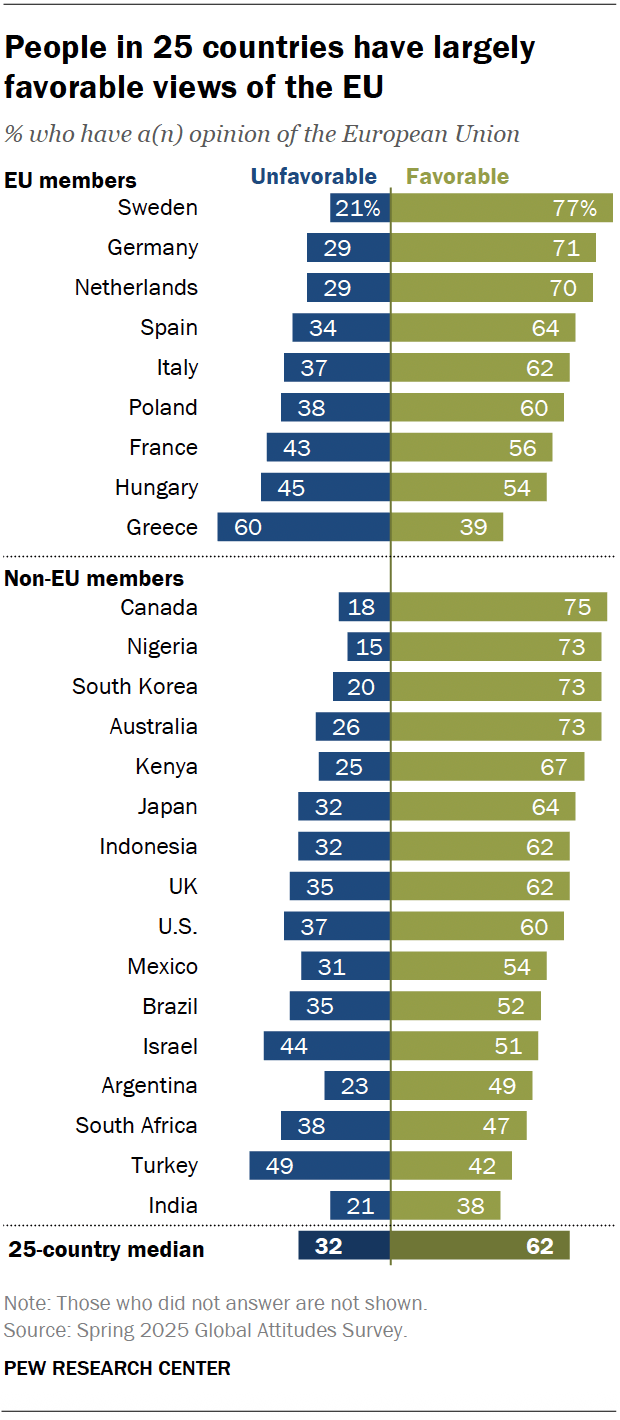
Among the nine member countries surveyed, seven-in-ten or more in Sweden, Germany and the Netherlands view the EU favorably. Over half in Spain, Italy, Poland, France and Hungary say the same. Views are more critical in Greece, where a majority have an unfavorable opinion of the EU.
Views also remain largely favorable across many of the 16 nonmember countries surveyed. In Canada, Nigeria, South Korea and Australia, roughly three-quarters have a favorable opinion of the EU. And six-in-ten or more agree in five other nonmember countries, including the United Kingdom, a former member, and the United States.
In Argentina, Brazil, Israel and South Africa, around half view the EU favorably, and 54% say the same in Mexico. Roughly four-in-ten Indians share this view, while two-in-ten view the organization unfavorably. Another 41% did not provide an opinion.
In Turkey, opinion is divided, with substantial shares expressing both positive (42%) and negative (49%) views of the organization. Negotiations over Turkey’s potential membership in the EU have been frozen since 2018.
How views of the EU have changed over time
Opinions of the EU have remained relatively stable from last year across the 25 countries surveyed.
Views have ticked upward since 2024 in Nigeria (+11 percentage points), Canada (+9), Germany (+8), Australia (+5) and India (+5). Views are also up from last year in South Africa (+13), though a larger share of South Africans offered an opinion in 2025 than in 2024. Favorability has fallen in Kenya (-10) and Greece (-8), reaching its lowest point in Greece since 2018.
In Turkey, opinion remains more positive than in 2019 and in most prior years.
How views of the EU vary by ideology
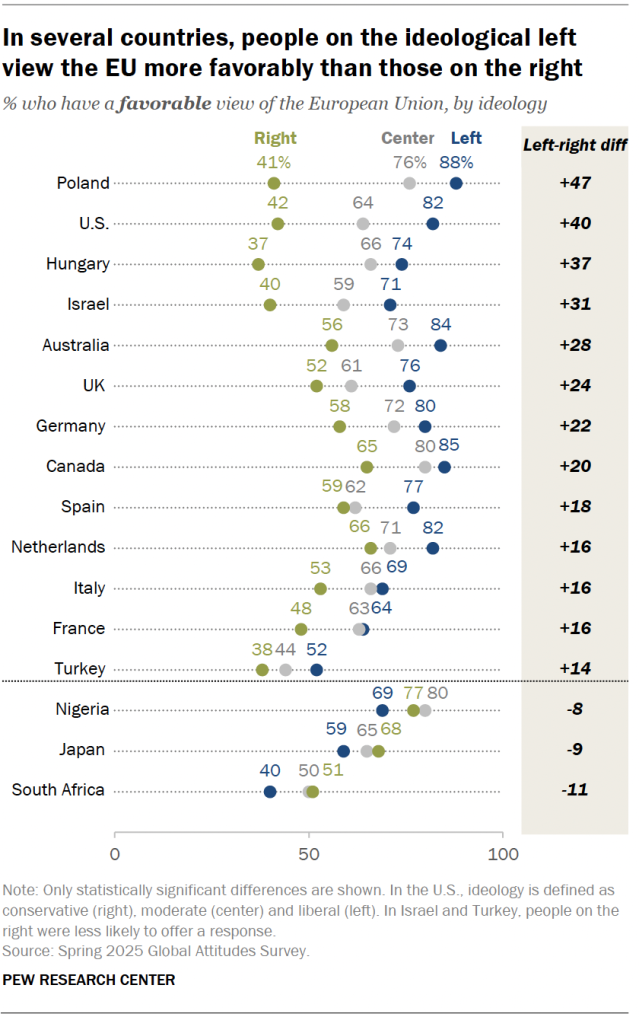
As previous Center surveys have noted, opinions of the EU tend to vary along ideological lines in both member and nonmember countries. In about half of the countries surveyed, those on the ideological left are at least 10 points more likely than those on the right to view the EU favorably.
The gap in Poland is among the largest. There, 88% of people on the left have a favorable opinion of the EU, compared with 41% of those on the right.
In Nigeria, Japan and South Africa, though, those on the right are more likely to have a favorable view of the EU.
In European countries, most people who do not support right-wing populist parties are more likely than supporters to see the EU favorably. For example, in Germany, those with negative views of Alternative for Germany (AfD) are 54 percentage points more likely than AfD supporters to view the EU favorably (82% vs. 28%). (Nonsupporters of Greece’s Greek Solution were less likely to respond to the question.)
For more information on how we classify populist parties, read the appendix.
In four countries where we classify center- or left-wing populist parties – France, Greece, Italy and Spain – those who have a favorable view of the center- or left-wing populist party in their country are more likely than those who don’t to view the EU positively. (Nonsupporters of Spain’s Podemos party were less likely to respond to the question.)
How views of the EU vary by age
In many countries, younger adults are also more likely than older ones to view the EU favorably. In Hungary, for example, 69% of adults under the age of 35 have a positive opinion of the organization, compared with 46% of adults 50 and older.
This pattern is present in countries within and outside the EU. However, older adults in some places are somewhat less likely to provide a response.
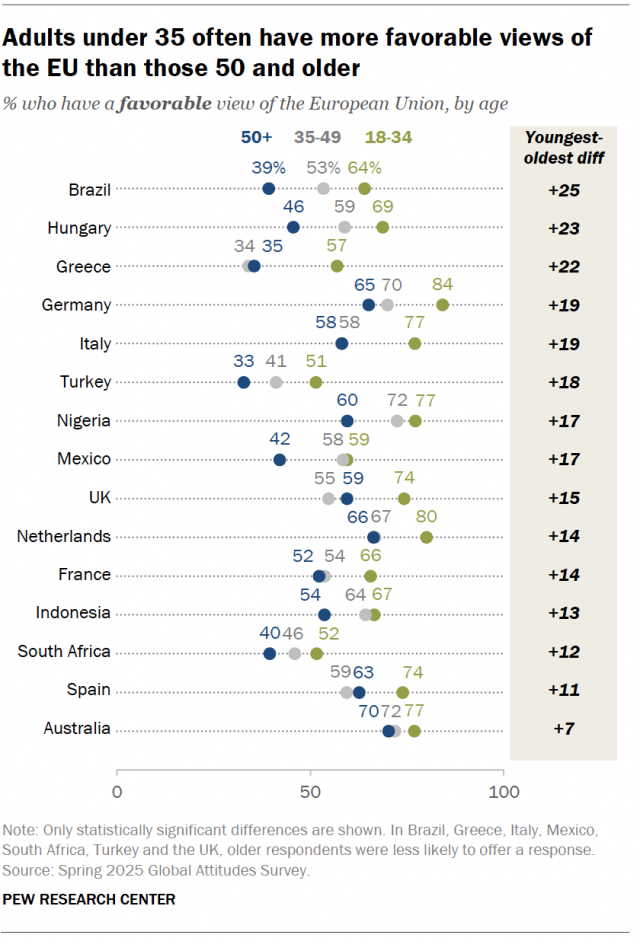
Where the EU is seen as an ally
We also asked people across the 25 nations surveyed which country they consider the most important ally to their own. This was an open-ended question, so people could name anything that came to mind. In some countries, both within and outside the bloc, people cite the EU as their country’s most important ally.
In Hungary, Spain and the UK, two-in-ten or more name the EU as a key ally, and the organization ranks among the three most common responses. The EU ranks among the most common responses in nearly every other European country surveyed, as well as in Canada. Greece is the only member country surveyed where the EU does not rank among the top three.
We also asked people what country they believe poses the greatest threat to their country. No more than 3% in any country name the EU.
As with overall views of the EU, in several countries, people on the ideological left are more likely than those on the right to consider the EU their country’s most important ally. In Poland, 22% of those on the left say the EU is the country’s most important ally, while 6% on the right agree.
Supporters of right-wing populist parties in some countries are also less likely to name the EU as a key ally. In Hungary, 9% of those who have a favorable view of Fidesz, the ruling party led by Prime Minister Viktor Orbán, say the EU is Hungary’s most important ally. That compares with 36% of those who do not support Fidesz.
Related: People in Many Countries Consider the U.S. an Important Ally; Others See It as a Top Threat
Who sees the EU countries as the world’s leading economic power
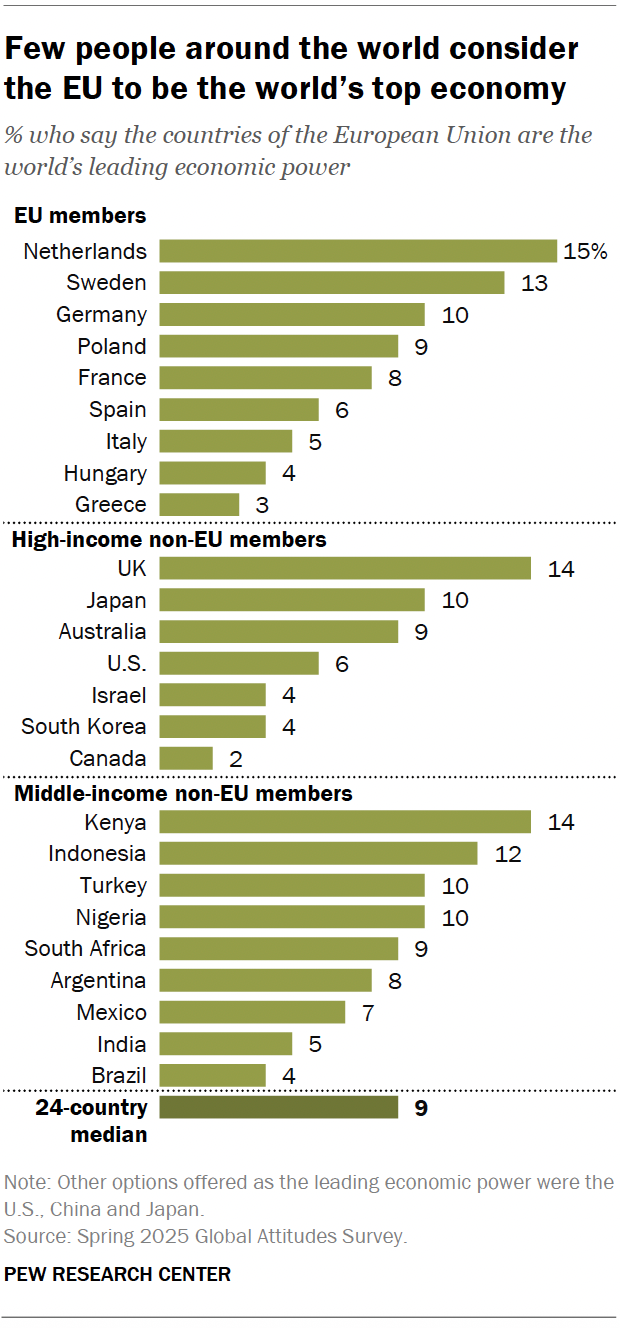
We also asked people whether they consider the U.S., China, Japan or the countries of the EU to be the world’s leading economic power. A median of 8% across 25 countries say it’s the EU member countries. That is much lower than the share who choose China (41%) or the U.S. (39%), and roughly similar to the share who choose Japan (7%).
People in the Netherlands, the UK, Kenya, Sweden and Indonesia are among the most likely to think the countries of the EU are the world’s leading economy, with about 15% saying this.
People in a few European countries are less likely now than in the past to say the EU is the world’s top economy.
For instance, 31% of Germans said in 2008 that the EU is the world’s leading economic power. Today, that share is just 10%. The change is significant in Spain and France as well (down by 14 and 6 points, respectively).
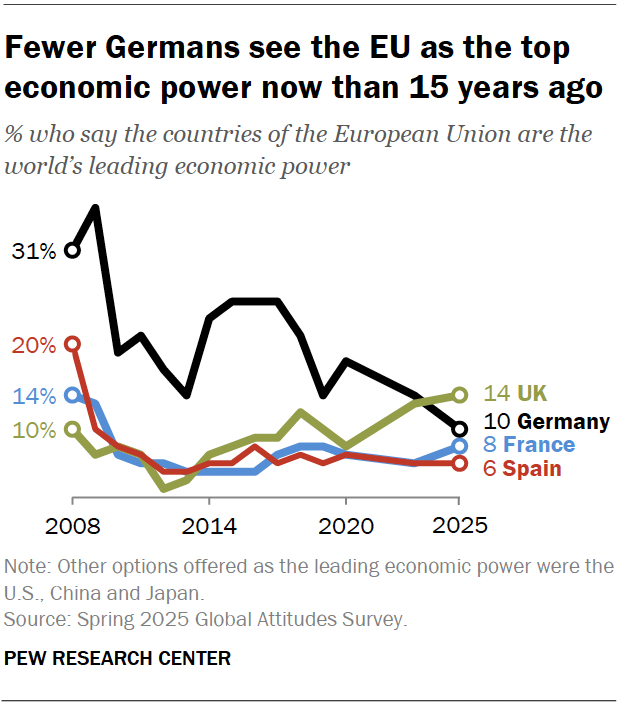
On the other hand, the share of Britons who say the EU is the top economy has grown from a low of 3% in 2012 to 14% today.
CORRECTION (Jan. 26, 2026): This analysis previously misstated the median shares who say EU member countries and the U.S. are the world’s leading economic power. The text and accompanying chart titled “Few people around the world consider the EU to be the world’s top economy” have been updated. This change does not affect other substantive findings.
Note: Here is the question used for this analysis, along with responses, and the survey methodology.

